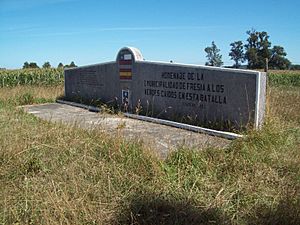Battle of El Toro facts for kids
Quick facts for kids Battle of El Toro |
|||||||
|---|---|---|---|---|---|---|---|
| Part of the Chilean War of Independence | |||||||
 Monument of the battle of El Toro , March 6, 1820 , Chilean war of independence . |
|||||||
|
|||||||
| Belligerents | |||||||
Lof of Railef |
|||||||
| Commanders and leaders | |||||||
| Strength | |||||||
| 140 2 cannons |
300 | ||||||
| Casualties and losses | |||||||
| 11 killed 29 wounded |
~40 killed 106 prisoners |
||||||
The Battle of El Toro happened on March 6, 1820. It was an important fight near Maullín, Chile. This battle was part of the Chilean War of Independence, where Chilean patriots fought against Spanish royalists. The patriots wanted Chile to be free from Spanish rule.
Why the Battle Happened
After the Chilean patriots captured the city of Valdivia, a leader named Lord Cochrane left. He put Colonel Jorge Beauchef in charge of Valdivia.
Beauchef decided to move his small army south. His goal was to take control of Osorno. He also wanted to push the remaining Spanish royalist forces out of mainland Chile. This would stop the Spanish from trying to take Valdivia back by land. Beauchef was worried because the royalist forces were much larger than his own.
Beauchef and his soldiers reached a place called Trumao. There, local Mapuche-Huilliche people helped them. They used their boats to ferry the soldiers across the Bueno River. They also provided ox carts to help carry supplies. Beauchef thanked them by giving them special gifts like liqueur and indigo dye. Some stories say that local Mapuche-Huilliche even joined the patriot army and fought in the battle. This support was a change, as they had previously agreed to support Spain.
Before this battle, all the royalist soldiers who had escaped from Valdivia and Osorno gathered at the Carelmapu Fort. The governor of Chiloé, Brigadier Antonio de Quintanilla, was unhappy with how the old Colonel Manuel Montoya had performed. So, he replaced him with Gaspar Fernández de Bobadilla and Captain Miguel de Senosiain. He ordered them to go back north and fight the patriots. Bobadilla and Senosiain led about 300 soldiers across the Maullín River.
The Battle Begins
On March 6, Colonel Beauchef sent a small group of 50 soldiers forward. This group was led by Captain José María Labé. As Labé's scouting party moved south, the royalists attacked them. The royalists had hidden in a forest near the Hacienda El Toro and ambushed the patriots.
Captain Labé and his men fought back for about an hour. But they were outnumbered and slowly began to retreat.
The royalists then came out of their hiding places. They chased the retreating patriots closely. When Beauchef heard the gunshots, he quickly decided to join the fight. He moved his 90 soldiers forward. This allowed Labé's tired troops to move behind them. There, Labé's soldiers could rest and reload their weapons.
Patriot Victory
The royalists now faced Beauchef's fresh and well-positioned patriot forces. The patriots had more firepower. The royalists didn't know how many soldiers Beauchef had. They became discouraged and stopped their attack.
Beauchef saw his chance. He immediately ordered a direct charge with bayonets. His soldiers rushed forward, causing the royalists to panic and run away. The patriots then used horses they had captured from the enemy to chase them.
The Spanish royalists left the battlefield. They lost about 40 soldiers who were killed. Another 106 were taken prisoner. The patriots also captured 140 guns and most of the royalists' ammunition. Beauchef's forces had 11 soldiers killed and 29 wounded. This battle was a clear victory for the Chilean patriots.
See also
 In Spanish: Combate de El Toro para niños
In Spanish: Combate de El Toro para niños
 | John T. Biggers |
 | Thomas Blackshear |
 | Mark Bradford |
 | Beverly Buchanan |

